Basanta Singha Roy opens up about the unfortunate demise of Pemba Sherpa
Pemba Sherpa (45) of Darjeeling, India went missing after falling down into a crevasse on Saser Kangri since 13th July, 2018. He was climbing the peak Saser Kangri IV (7416m) with a team of climbers led by Basanta Singha Roy from West Bengal and an another team from Pune, India. No rescue effort yielded any results. He stayed inside the crevasse.
In an interview with Dream Wanderlust, this is what the team leader, Basanta Singha Roy had to say about the whole incident.
Timeline
Expedition:(As reported by Biswanath Saha and Anil Retawade, summit members of the team)
12th July 2:40am: Left summit-camp (Camp-3, 6940m) to reach summit (7416m).
12th July 8am: Reached summit (Summit members: Pemba Sherpa, Pemba Tshering, Lakhpa Sherpa, Biswanath Saha and Anil Retawade)
12th July 10am: Returned back to the summit camp. Took rest for 2hrs.
12th July 6:30pm: Returned to Camp-2 (6025m)
13th July 6:30am: Left Camp-2 and started descending towards Camp-1.
13th July 8:15am: Accident took place. Pemba fell down into crevasse before reaching Camp-1 at an altitude of 5750m.
13th July 8:30am: Initial inspection resulted into nothing. Pemba Tshering (with others) started descending to inform others.
(As reported by Pashang Futar Sherpa, the climber who went down into crevasse for rescue)
13th July 10:30am: Pashang Futar Sherpa (climbed from Base Camp towards with food and water to support the climbers coming down from summit) was informed by Pemba Tshering about the accident at above Camp-1. Together they reached at Camp-1 to take available gears.
13th July 12:30pm: Pashang Futar reached at the spot with available gears.
They collected fixed rope from nearby. Pashang Futar went down (18ft) into crevasse at around 12:45 with head torch and saw zigzag pattern inside. Then he came across some green colored thing but there was no trace of life. Afterwards Pashang Futar felt difficult to communicate with belayer at the top as sound did not reach above.
13th July 4pm: Came to Camp-1 at 4pm.
13th July 7:30pm: All climbers reached at Base Camp.
14th July in the morning: Tshering went down with one Sherpa, Pashang (Cook), to road head (Phukpu Cha) to send news to home (also to meet the leader Basanta Singha Roy).
14th July night: Pashang Futar Sherpa requested for Sherpa help from ITBP team, got refused as order waited from higher authority.
15th July: All five Sherpa and staff went to that spot again and it was impossible for them to go down into crevasse again. Meanwhile, ITBP team got the order to help and agreed to move. Jointly decided to turn around as there was no sign of hope.
Camps: Base Camp (4720m) - Camp-1 (5600m) - Camp-2 (6025m) - Camp-3 (6940m) - Summit (7416m)
Altitude of the spot: Approximately 5750m (Nearer to Camp-1)
Formation of the team during the time of accident (front to rear): Pemba Sherpa, Pemba Tshering Sherpa, Anil Retawade, Lakhpa Sherpa and Biswanath Saha.
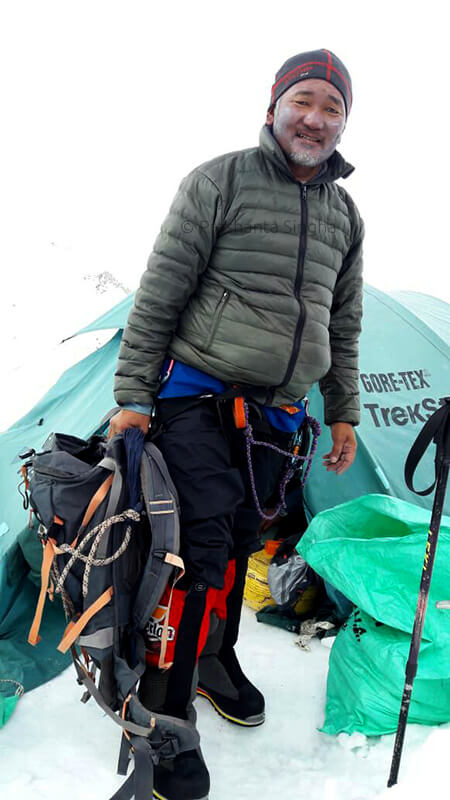
Pemba Sherpa at Camp-2, 11th July, 2018
Interview with Basanta Singha Roy
DW: We have been getting different updates sitting here in Kolkata. We mentioned just a while ago, that the news about accident shook everyone as Pemba ji is well-known to all of us. But we never came to know what exactly happened to him, especially from you. You might have discussed it with few others over phone, but then again, we would really appreciate, if you would narrate what exactly happened in brief, it would be the best for everyone.
BASANTA SINGHA ROY: Whatever you heard, that is the truth. After we came back, whatever you heard from us is the real incident. He (Pemba) was on his way back after the summit on 12th July, 2018 with other climbers, Pemba Tshering Sherpa, Lakhpa Sherpa, Anil and Biswanath Saha. Next day on 13th July, team had started their downwards journey approximately at 7:30am from Camp-2. Two members (Anil Retawade and Biswanath Saha) had been walking a little ahead of the others. The other three Sherpas (including Pemba) were also on their way back once they finished rolling all the tents and gears. Gradually, within nearly half an hour, Pemba managed to surpass the other two mountaineers who were initially ahead of him. Upon witnessing a crevasse on their way, he had started examining it as he normally checks with Snow Stick or ice axe when we are generally on other expeditions. Given the situation of rapid snowmelt, had the climbers been roped up suitably, (which wasn't the case) this accident would have never happened.
DW: Perhaps, he figured that the circumstances could have been negotiated given that he is highly experienced even though the route wasn't roped up.
BASANTA SINGHA ROY: Yes, it could be. So, the place where he was standing upon, was on a hidden crevasse. That was the only thing he failed to comprehend. The gap (of the crevasse) was 1 meter, presumably. Furthermore, the thin layer was another culprit which made him fall through the crevasse straightaway. That is the story.
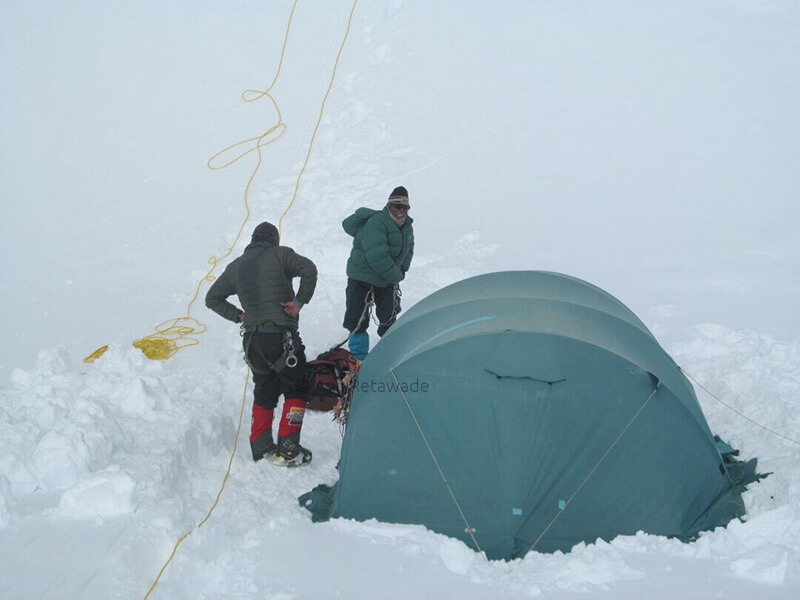
Pemba Sherpa and Biswanath Saha at Camp-3
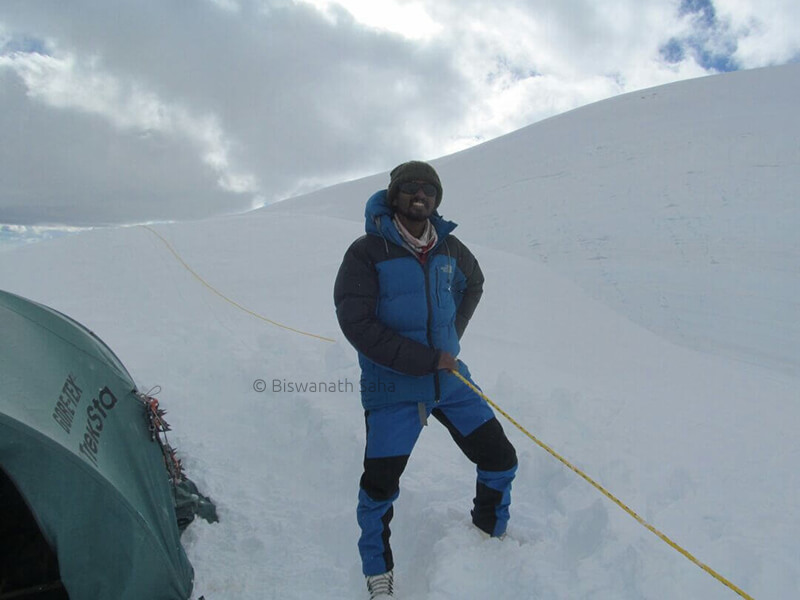
Anil Retawade at Camp-3
DW: When he fell off, who were the other people present over there?
BASANTA SINGHA ROY: Pemba Tshering, Lakhpa Sherpa, and two other members. Biswanath and Anil.
DW: Right after that, could he be traced anyhow? What did the other mountaineers do at that moment?
BASANTA SINGHA ROY: No, they got frightened instantaneously. Given the fact that someone just fell through a crevasse right in front of their eyes, even after shouting out loud and looking down very cautiously, it was just pin-drop silence inside the crevasse. In that scenario, being so petrified like this is justified. Two members already had climbing ropes with them but not as lengthy as Pemba ji had (in his own sack). Pemba had long climbing ropes (of 7mm) with him. Some line ropes (fixed) were existing in that place. So, what they did was, clipped all the slings they had and moved around the rocky sides. Subsequently, two members were brought to Camp-1 safely over the moraine route and found Pashang Futar once they reached Camp-1. Once they came back to the surroundings of crevasse again with Pashang Futar, they realized that the polypropylene ropes (fixed rope) collected from Kitchen place, weren't sufficient to continue the search operation any further. Then they climbed a bit up to get the ropes (few fixed and spread around the crevasse to cross it with safety) and went down by approximately 18ft. There was no trace of any human sound but only snow-molten waters. According to Pashang Futar Sherpa, it was at least 40-50 feet deep inside. According to him, he might have seen Pemba's rucksack.
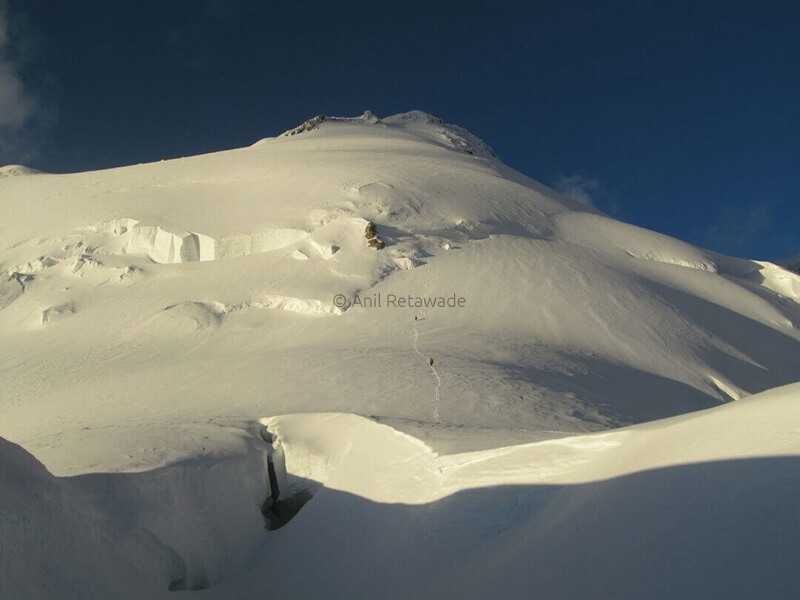
Route opening at the summit ridge. Summit is visible on the right
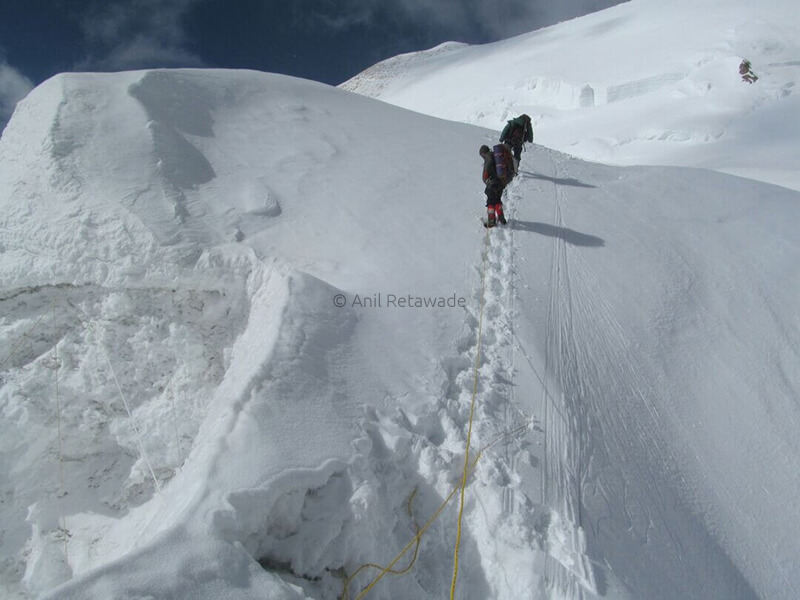
Pemba Sherpa and Biswanath Saha near the summit camp
DW: Did Pashang ji go down the crevasse?
BASANTA SINGHA ROY: Yes, his elder brother did. So, needless to say, Pemba Tshering and Lakhpa, both of them got even more terrified of what might happen if Pashang Futar too gets stuck in the crevasse, then rescuing both of them would be another huge trouble. Out of fear, they shouted out to Pashang Futar, "Uncle, if you too get stuck, we won't be able to get both of you out of here." Likewise, they were already very tired, summitting such a difficult peak just the other day. Therefore, observing no trace of Pemba, Pashang Futar realized it's impossible to move further. Hence, he came up from the crevasse. By then, we already got the information of their whereabouts and they were all on their way back to the Base Camp.
DW: Where exactly were you back then?
BASANTA SINGHA ROY: I was at the Base Camp during the summit on 12th July. Earlier I told them that I will stay back at Camp-2 on 11th July with all of them. But then, Pemba Sherpa insisted me to go back to the Base Camp with the staff. When they started attempting summit on 11th July, 5 members including me, Pashang Futar and Pashang (cook) descended back to the Base Camp. We were informed via walkie-talkie by Pemba Sherpa the next day, on 12th July around at 8 in the morning that they have successfully climbed even though it was too windy up there. We did check the weather update which forecasted clear weather but way too cold and windy. No further update was received since then.
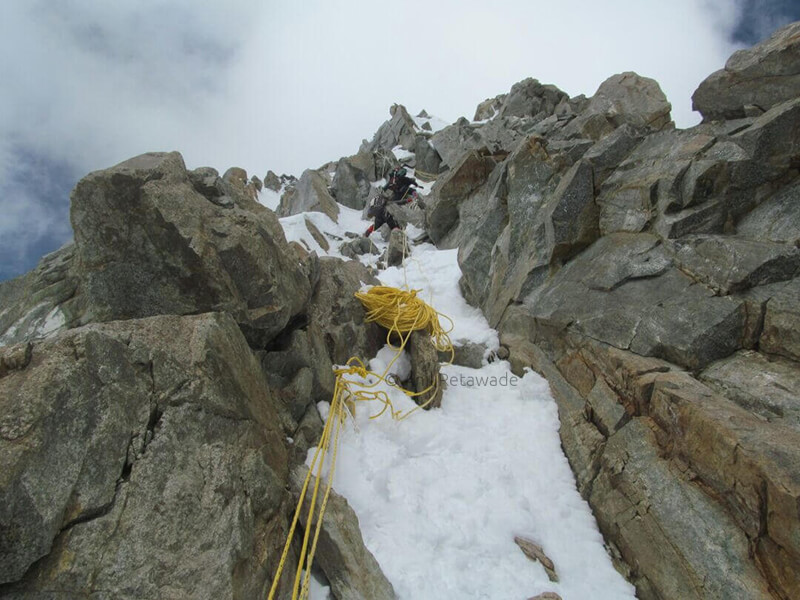
Rocky section near Camp-3 (Pemba and Biswanath in the frame)
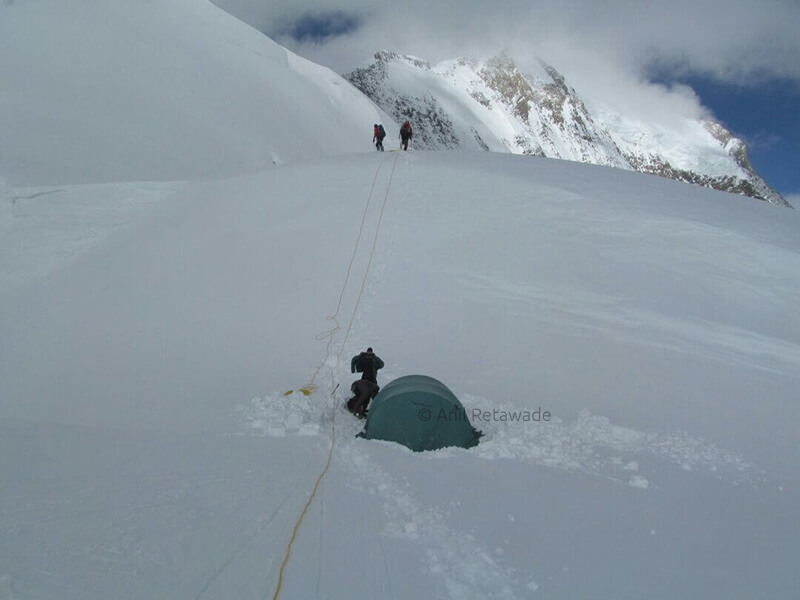
View of Camp-3 (Summit Camp). Lakhpa and Pemba Tshering at the distant; Pemba Sherpa and Biswanath near the tent
DW: You were at Base Camp on 12th July?
BASANTA SINGHA ROY: Yes, at Base Camp. Atop the summit point, they spoke to us using walkie-talkie. We are informed that they summited around 8am. Then we wished them our best on their way back to Base Camp. But we did not update anyone on this (summit news). Even there was a team present of ITBP (Indo-Tibetan Border Police), we did not tell them either. Because, unless the entire team is back safe and sound, neither do I usually prefer to share any news, nor do I accept the expedition to be a success. Also, this was the first time in my life that I came back early, and our team was left up at an earlier camp. However, I chose not to share any information with the ITBP team saying that the summit is successful.
DW: Was the ITBP team around your Base Camp?
BASANTA SINGHA ROY: Yes, they were staying at the same place and were busy in load ferry from lower camps to the Base Camp to climb Plateau Peak. Six Sherpa of them had occupied Base Camp on 13th July.
DW: Okay.
BASANTA SINGHA ROY: However, we spent the entire day at Base Camp in sheer stress during their return from summit. On 13th July, we had, immediately, sent Pashang Futar up there at Camp-1 along with some food and water. He left Base Camp around at 7am and most likely, reached up to Camp-1 by 10 in the morning. On 13th July I was anxiously awaiting updates from them about their safe arrival back at the Base Camp. I had sent two other people a bit aloft with a walkie-talkie, so that they could update me if they find a slightest trace of anyone climbing downwards. They had been waiting at a point an hour away from Camp-1. Around 3:30pm, I was informed that they could see 2 people coming down and also, right behind them, another 3-4 of them were on their way back. Then I figured that I should start planning to go further down towards road head from the Base Camp and went ahead climbing downwards with 2 other members. Few of the Sherpas had shifted to ITBP camp on 13th July itself.
After I went back to road head, it immediately came to my knowledge that those 2 members (whom I sent up on the way to Camp-1 to look after the summiters) had already informed the ITBP team (who were still present there at the Base Camp) saying that Pemba ji is missing. Then I spoke to their team.
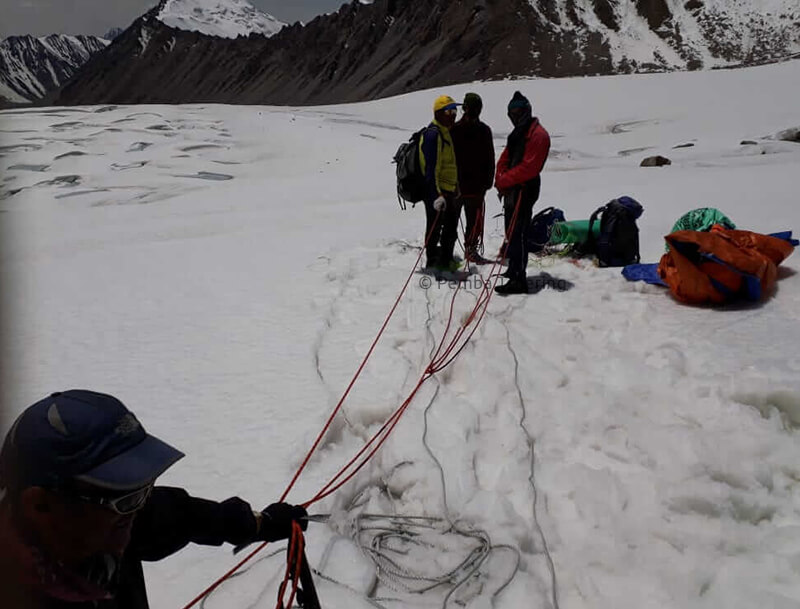
Rescue in process
DW: So, it was 13th July.
BASANTA SINGHA ROY: Yes, I left the Base Camp at 3:45pm and around 7:45-8pm, I had already reached down the lower camp (road head). Then I spoke to ITBP team and they had let me borrow a car to go to the Nearby Police Post to inform them about the accident and also, to ask for help. Then I came to know that Officer wasn't present at that moment.
DW: Which Police station?
BASANTA SINGHA ROY: Panamik.
DW: Okay, That Panamik Police Station, we were connected to them throughout during that phase. Md. Hasan was in charge.
BASANTA SINGHA ROY: Yes, exactly. He told me, "I will come in the morning then you can come." Realizing that nothing could happen until next morning, I went back to my place again and met 2 other members who had climbed down from Base Camp to meet me. Because, they were not sure whether I really had received any information (about the accident) through the walkie-talkie or not. The next morning, Pemba Tshering and Pashang (cook) too, came here panting anxiously to let us know that nothing can be done at all anymore.
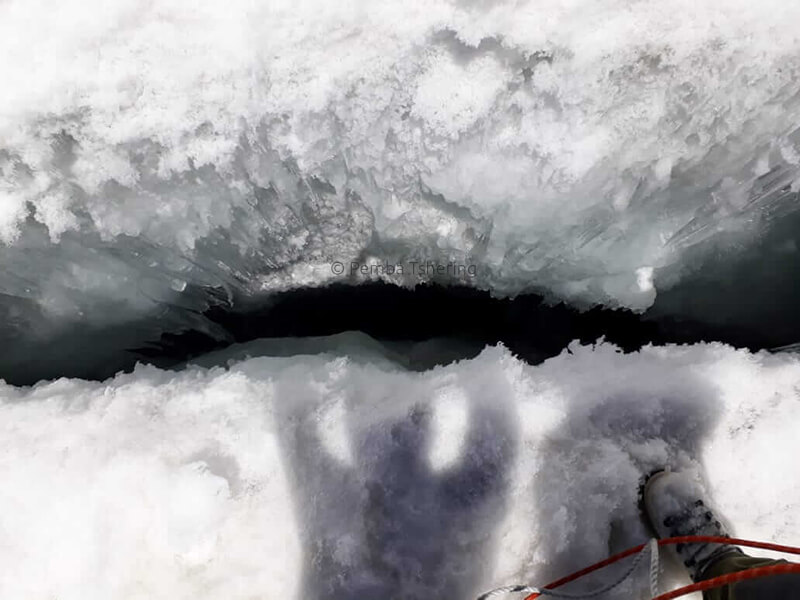
The crevasse where Pemba Sherpa fell down
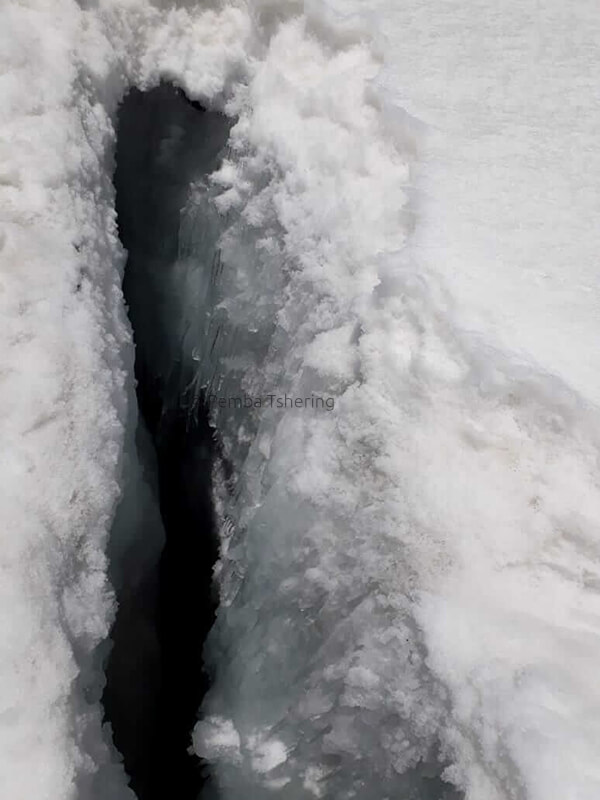
Another view of the crevasse
DW: As a matter of fact, the crevasse was so deep that nothing could be done?
BASANTA SINGHA ROY: They could not find any trace of him. The point is when nobody could find a slightest trace of him after going down to a depth of 18-20ft, how could it even be realistically possible to find him at all? One can only guess how deep he might have fallen into. According to Pashang Futar's statement, it must be 40-50ft. As per his vast experience is concerned, probably, his conjectures were accurate. Despite that, I insisted him to search again the next day.
DW: Then?
BASANTA SINGHA ROY: ITBP had already been informed by IMF (Indian Mountaineering Foundation) to help search operation. They said they would help. Debraj (Dutta) helped to communicate at that point in time. Later I heard that Pashang Futar urged them a lot saying that he will climb down the crevasse again in the presence of ITBP Sherpa. Though, it was well-understood that ITBP Sherpa employees would not continue further without any official order. Meanwhile, I had taken Pemba Tshering and Pashang (cook) to the Police Station in the morning asking for help. Given the fact that ITBP had already been coming with further arrangements, the local police station seemed pretty laid back. Whereas, ITBP team was awaiting official orders to begin the rescue operation the entire day on 14th July. Then finally, upon receipt of orders on 15th July at 10am, Meanwhile, Pemba Tshering, Pashang Futar Sherpa, Lakpa Sherpa, Pashang (cook), and Ballu had resumed the operation. They all climbed up along with ropes and other mountaineering gears, saw the crevasse well, clicked pictures for proof but decided not to go much further because, they could not find any trace. Hence, they came back on 15th July, on the same day itself as it was impossible for them at this point to rescue him. Later, ITBP stated saying that their team did not go farther as the other 5 had come back as well and they jointly agreed to return. To be more precise, they started at 3:30am on 15th July and reached around 8am. Then they came back after an hour of continuous search operation.
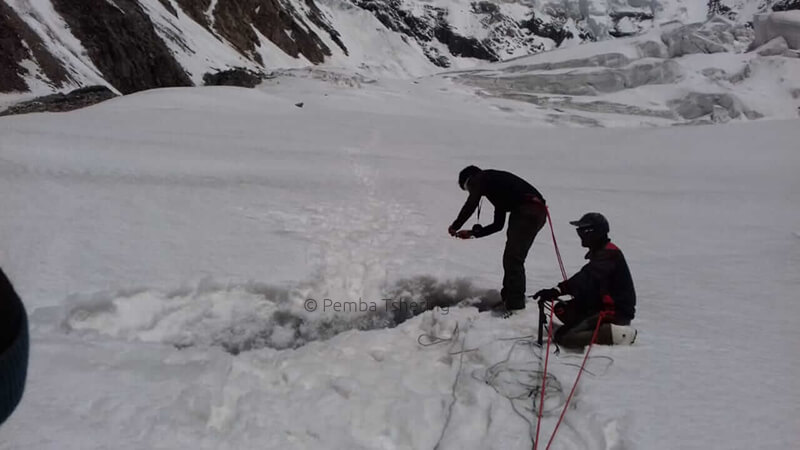
Search of missing Pemba Sherpa
DW: Who exactly are these people, again, who came back after clicking pictures and the search operation was done?
BASANTA SINGHA ROY: Our own Sherpas. On 14th July itself, Pashang Futar sent all the members who came back earlier once they lost hope and another 2 of them, came down on 16th July. Though we faced some other trouble from the local police station during few official formalities, we came back with his missing certificate. Still I would say that they issued all the statements and certificates as earliest as possible, otherwise, we would have to wait for another 2 days. Besides, they recorded all our statements – mine and other 5 members'. Eventually they understood that it is, indeed, an accident. Then we came back. That's it.
DW: All right. Do you think that the accident could have been avoided anyhow?
BASANTA SINGHA ROY: No, no, no. I do not think anything could have been done here. But yes, if it were roped up all along the route, probably, he could have been saved. Because if one is to fall, others would be able to pull him up. Then again, according to his physical feature, I am not sure what could have been really possible, to be exact.
DW: We heard that he had few ropes with him as well.
BASANTA SINGHA ROY: Yes, he did have 2 climbing ropes with him. Not as thick as 9-10mm - little thinner than that, but still, those were in good condition. He not only had ropes, but also a walkie-talkie as well. He always had a tendency of carrying extra loads all by himself so that other members of the team could be in relief while climbing. He was really a caring person.
DW: Then the weight was already a bit much when he fell off. Don't you think?
BASANTA SINGHA ROY: No, that much of weight is usually okay for him. Because, the members aren't normally used to carry such weight.
DW: No. What I meant was, when he was falling down, the weight was much more than what it should have been. That might be a reason for further cracks along the crevasse, thus, lengthier downfall through it.
BASANTA SINGHA ROY: Additionally, his body weight was much higher than normal.
DW: Do you think his body could have been rescued somehow?
BASANTA SINGHA ROY: What could I say more on this? When nobody could trace out his body within 2-2.5hrs after his fall, what could have been said. Though it would have been more satisfactory if pursued harder.
DW: Have you informed WBMASF (West Bengal Mountaineering & Adventure Sports Foundation) for rescue purposes?
BASANTA SINGHA ROY: I was not here. But my club has sent letters to them.
DW: They did not initiate anything regarding this. Did they?
BASANTA SINGHA ROY: I met them personally after that. Nonetheless, I do not think that anything could have been done at that time. Few of the Sherpas, climbed Mt. K2 twice, Mt. Nanga 5 times. These Sherpas happened to be blood relatives of our cook, Pashang from the village called Makalu. If the team present there at accident point, could not rescue Pemba, then it clearly, does not make sense for anyone new to get acclimatized there, then start the rescue operation. That would have been more time-consuming. The easiest process would have been if the ITBP team could reach there to start the operation within 4hrs. Rather than anyone else, what Pemba's elder brother had done, is anytime more reliable than anything else, given Pashang Futar's extensive experience.
DW: Obviously. As a brother, he must have tried his level best.
BASANTA SINGHA ROY: We understood that nothing was really possible.
DW: But accepting that fact must have been very difficult.
BASANTA SINGHA ROY: In spite of that, we urged them a lot to search as we were looking for a miracle. But, alas.. nothing happened.
DW: Yes, nothing could be said more on this.
BASANTA SINGHA ROY: Yes, accidents are usual at expeditions. Nonetheless, after so many successful voyages, it was such a shock for us that he would fall here like this. Had he fallen off, get rescued, then, cremated, that would have completely been a different case. But here, he breathed his last in this snowclad mountain and laid there forever. I simply cannot come to terms with it. Accidents can take place anywhere, with anyone – even with me or someone else. But I could never accept his disappearance like this.
DW: While coming down so easily, suddenly, this happened. Indeed, a disheartening event.
BASANTA SINGHA ROY: It usually does not happen at places like that. It was mostly flat, nothing to roll downwards as such. Yet, there was the crevasse. We have already crossed through that path a couple of times earlier. Nothing had happened to anyone of us. Even they did cross that crevasse just 2 days prior to this incident. Breaking down in tears, Pashang Futar opened his heart out saying that his brother's life was written until then. However, now the most important thing is to stand by his family.
DW: Thank you so much for giving us time.
Photo Courtesy: Pemba Tshering Sherpa, Anil Retawade, Biswanath Saha and Prashanta Shingha
This news was revised on 14-08-2018
Subscribe Us On YouTube
Related News
Address: Ogg Road, Noapara, Shyamnagar, North 24 PGS, West Bengal - 743127, India
E-mail: dreamwanderlust@gmail.com
City Office: 87/F Purba Sinthee Cross Road. Dum Dum, Kolkata - 700030




